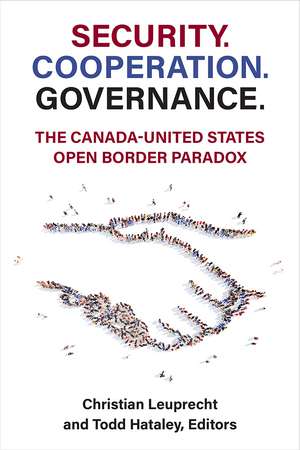Security. Cooperation. Governance.: The Canada-United States Open Border Paradox
Editat de Christian Leuprecht, Todd Hataleyen Limba Engleză Paperback – 25 oct 2023
The book’s findings show that border governance straddles multiple regional, sectoral, and security scales in ways rarely documented in such detail. These developments have precipitated an Open Border Paradox: extensive, regionally varied flows of trade and people have resulted in a series of nested but interdependent security regimes that function on different scales and vary across economic and policy sectors. These realities have given rise to regional and sectoral specialization in related security regimes. For instance, just-in-time automotive production in the Great Lakes region varies considerably from the governance of maritime and intermodal trade (and port systems) on the Atlantic and Pacific coasts, which in turn is quite different from commodity-based systems that manage diverse agricultural and food trade in the Canadian Prairies and US Great Plains.
The paradox of open borders and their legitimacy is a function of robust bilateral and multilevel governance based on effective partnerships with substate governments and the private sector. Effective policy accounts for regional variation in integrated binational security and trade imperatives. At the same time, binational and continental policies are embedded in each country’s trade and security relationships beyond North America.
Preț: 211.11 lei
Nou
Puncte Express: 317
Preț estimativ în valută:
40.40€ • 42.02$ • 33.35£
40.40€ • 42.02$ • 33.35£
Carte disponibilă
Livrare economică 24 martie-07 aprilie
Livrare express 07-13 martie pentru 22.02 lei
Preluare comenzi: 021 569.72.76
Specificații
ISBN-13: 9780472055715
ISBN-10: 0472055712
Pagini: 232
Ilustrații: 1 table, 3 figures
Dimensiuni: 152 x 229 x 15 mm
Greutate: 0.31 kg
Editura: UNIVERSITY OF MICHIGAN PRESS
Colecția University of Michigan Press
ISBN-10: 0472055712
Pagini: 232
Ilustrații: 1 table, 3 figures
Dimensiuni: 152 x 229 x 15 mm
Greutate: 0.31 kg
Editura: UNIVERSITY OF MICHIGAN PRESS
Colecția University of Michigan Press
Notă biografică
Christian Leuprecht is Class of 1965 Distinguished Professor in Leadership at the Royal Military College of Canada and Director of the Institute of Intergovernmental Relations in the School of Policy Studies at Queen’s University.
Todd Hataley is Professor in the School of Justice and Community Development at Fleming College.
Todd Hataley is Professor in the School of Justice and Community Development at Fleming College.
Cuprins
Illustrations
Acronyms
Acknowledgments
Foreword
1: Introduction
Christian Leuprecht, Todd Hataley, and Emmanuel Brunet-Jailly
2: British Columbia and the Pacific Northwest
Benjamin Muller, Laurie Trautman, and Nicole Bates-Eamer
3: Alberta and the Northwest
Jamie Ferrill, Geoffrey Hale, and Kelly Sundberg
4: The Prairies and the Midwest
Todd Hataley, Christian Leuprecht, and Alexandra Green
5: Ontario and the Great Lakes
Todd Hataley and Christian Leuprecht
6: Québec and the Eastern Seaboard
David Morin, Stéphane Roussel, and Carolina Reyes Marquez
7: Atlantic Canada and New England
Kevin Quigley and Stephen Williams
8: The Territorial North
Heather Nicol, Adam Lajeunesse, Whitney Lackenbauer, and Karen Everett
Conclusion
Emmanuel Brunet-Jailly, Todd Hataley, and Christian Leuprecht
Contributors
Index
Acronyms
Acknowledgments
Foreword
1: Introduction
Christian Leuprecht, Todd Hataley, and Emmanuel Brunet-Jailly
2: British Columbia and the Pacific Northwest
Benjamin Muller, Laurie Trautman, and Nicole Bates-Eamer
3: Alberta and the Northwest
Jamie Ferrill, Geoffrey Hale, and Kelly Sundberg
4: The Prairies and the Midwest
Todd Hataley, Christian Leuprecht, and Alexandra Green
5: Ontario and the Great Lakes
Todd Hataley and Christian Leuprecht
6: Québec and the Eastern Seaboard
David Morin, Stéphane Roussel, and Carolina Reyes Marquez
7: Atlantic Canada and New England
Kevin Quigley and Stephen Williams
8: The Territorial North
Heather Nicol, Adam Lajeunesse, Whitney Lackenbauer, and Karen Everett
Conclusion
Emmanuel Brunet-Jailly, Todd Hataley, and Christian Leuprecht
Contributors
Index
Recenzii
“This book makes the case that a border is not a uniform dividing line between sovereign states but a series of interlinked channels between distinct communities. It is a unique piece of scholarship that demonstrates how border policies related to security, immigration, and trade are tied to regional preferences, mediated by federal and binational policymakers.”
“This book presents a richly detailed picture of the border between the United States and Canada. It makes clear that we can have trade and security at the same time. Policymakers will want to refer to this book for evidence that if we approach the border in a smart way, if we dedicate adequate resources, and if we use technology creatively, the United States and Canada can stay safe, secure, and economically competitive.”
“I found Security. Cooperation. Governance. The Canada-United States Open Border Paradox to be exceptional in presenting a compelling view of the dynamic cross-border regional cooperation and collaboration that impacts border security, policy, and culture across the US–Canada border.”
"Taken together, the contributions to this volume offer an account of a specific form of international relations in which cooperation is not stymied by contradictory interests or uneven commitments, but by a tension inherent in a collaborative project. This volume serves as a thoroughly informative corrective to state-centric reflexes that might produce zero-sum thinking that both countries are interested in avoiding."
"The book certainly succeeds in its aim of moving on by showing how the logic of realist international relations is transformed by the interaction of security, economic, and political concerns, but also by different conditions and institutions along a common border. It also provides a genuinely comparative analysis of a subject too often confined to single case studies."
Descriere
Reveals Canada–US border and security policies vary drastically depending on regional needs
